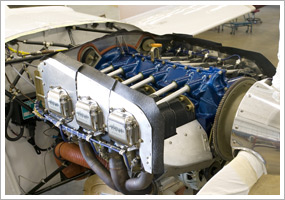training tipsKeeping it cool Don’t think of engine cooling as simply ram air entering the cowling and carrying heat away with it upon exit. Study how aerodynamic design plays a role. “Achieving adequate engine cooling under the demanding conditions in which aircraft operate—sweltering summer ramps and low-airspeed, hot-day climbs to altitude, for example—is no small feat. The path that the ram air takes through the cowling must allow for sufficient cooling of the engine in every phase of flight without creating performance-robbing, fuel-hungry excess drag,” Mark Twombly explained in the July 2001 Flight Training magazine’s “What It Looks Like” column. Does your engine’s cooling system have a mechanical component, such as cowl flaps? “Cowl flaps are hinged covers that fit over the opening through which the hot air is expelled. If the engine temperature is low, the cowl flaps can be closed, thereby restricting the flow of expelled hot air and increasing engine temperature. If the engine temperature is high, the cowl flaps can be opened to permit a greater flow of air through the system, thereby decreasing the engine temperature,” according to Chapter 6 of the Pilot’s Handbook of Aeronautical Knowledge . Proper use of cowl flaps is also a checklist item as you configure your aircraft for each phase of flight. Typically, cowl flaps will be opened for takeoff, closed for cruise and descents, and opened again during ground operations, when air flow over the engine is low. Check your pilot’s operating handbook for specific procedures. A related tip: If your airspeed in cruise seems a little lower than you would expect for the power setting, check that you remembered to close the cowl flaps. Descent planning also plays a part in temperature management by avoiding hazard at the other extreme of the temperature range: thermal shock resulting from the sudden reduction of power for a steep descent. Avoiding thermal shock is a caution usually reserved for takeoff and landing sessions or simulated emergencies in cold weather, but a long descent at idle power in summertime also requires careful engine temperature management. training products‘You Can Afford to Be a Pilot’ from Sporty’sThe cost of earning a pilot certificate is a thorny issue for many would-be aviators. Timothy S. O’Connor’s book, You Can Afford to Be a Pilot, says it addresses the topic of flying for fun on a middle-income budget. The 140-page softcover book sells for $10.95 from Sporty’s. See the website or call 800/776-7897 (800/SPORTYS) to order.
Note: Products listed have not been evaluated by ePilot editors unless otherwise noted. AOPA assumes no responsibility for products or services listed or for claims or actions by manufacturers or vendors. final exam
Question: I am interested in eventually flying professionally and was wondering if AOPA has any career information that will help me decide how best to pursue my interest.
Answer: You are entering the market at a good time, as the forecast for pilot hiring has never been better. Flight Training is a good first stop for this kind of information. The magazine has a Career Pilot section that offers articles on aviation career specialties and personal success stories, as well as a look at who's hiring in the industry. The "Career Advisor" answers questions from aspiring pilots by professionals who are already working in the field, and "Tech Talk" covers topics that one would encounter in everyday flying. The Career Pilot section on the website addresses everything from career development through turbine aircraft operation. Another great resource is AOPA's Guide to Flying Careers.
Got a question for our technical services staff? E-mail [email protected] or call the Pilot Information Center, 800/872-2672. Don’t forget the online archive of “Final Exam” questions and answers, searchable by keyword or topic. |
 Techniques for keeping your engine from overheating during taxiing or long climbs on hot days were the subjects of the July 29
Techniques for keeping your engine from overheating during taxiing or long climbs on hot days were the subjects of the July 29 

